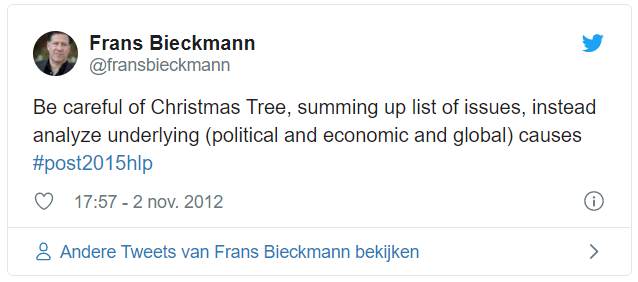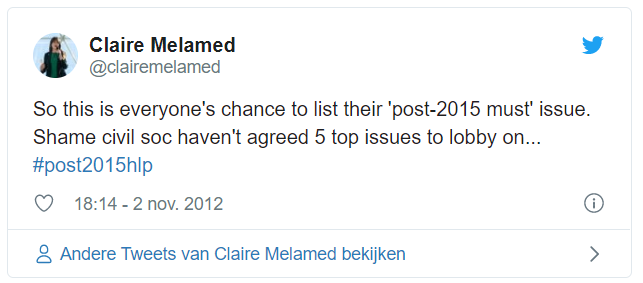At the end of the 1990s I wrote a lot about the alter-globalization movement. The movement really hit the headlines with the mass protests in Seattle and Washington and later in Prague and Genoa, and with the first gatherings of the World Social Forum in Porto Alegre, Brazil. In that same period Michel Camdessus, Managing Director of the International Monetary Fund (one of the symbols of the neoliberal globalization that the protesters opposed), had a kind of scorecard with ‘seven pledges’ which he promoted everywhere he went. These pledges were to become the International Development Goals and later the Millennium Development Goals.
I remember being very sceptical about the MDGs, because they were being endorsed by the official development community, mainly the leading donor countries, who were at the same time ignoring the millions of people who took to the streets all over the world to protest about the negative effects of globalization. The MDG initiative looked like a deliberate attempt to prevent further damage to the global economic project that was then at its height, with ICT bubbles, booming stock rates and even more booming profits for companies. And of course for their shareholders, who at that time accounted for a large number of citizens in Western countries, either directly or through pension funds and the like.
The IDGs, and later the MDGs, created a global common project for the good, to halve poverty, but at the same time sidelined movements calling for much more fundamental and structural change. In my opinion, the MDGs were a sideshow that did not address the root causes of poverty and of the marginalization of many people all over the world.
Since then, this feeling has become even stronger: development policies are increasingly creating a parallel world of ideal types, with concepts like human development, human security, etc., which sound wonderful but fail to substantially influence real life politics and economics.
Let me be clear: I endorse these ideals and I think we should strive to achieve them. I agree for example with the first report to the UN Secretary-General by the UN System Task Team (UNTT), Realizing the Future We Want for All, published in June 2012, which is cited in Lessons learned from the MDGs in this Post 2015 Broker Dossier. The UNTT calls for a more holistic approach and points to the need for transformative change to address current global challenges, stating: ‘Business as usual thus cannot be an option’. Above all, the report emphasizes that inequalities and environmental degradation are obstructing development, saying: ‘Persistent inequalities and struggles over scarce resources are among key determinants of situations of conflict, hunger, insecurity and violence, which in turn are key factors that hold back human development and efforts to achieve sustainable development.’
The point is not that these ideas and ideals are not right, but how come they are effectively sidelined during negotiation processes among real power-holders? In the end it is interests and power balances that determine the agenda.
My opinion on the MDGs has not really changed since the early 2000s, and I perfectly understand the scepticism of many critics about the current talks on a post-2015 agenda, like Duncan Green in this Broker blog post or discussing Post 2015 with Claire Melamed on his own FP2P blog. This scepticism is caused not only by the frustratingly slow and opaque international negotiating processes in multilateral organizations like the UN and its (far too) many branches, but also by the attitudes of civil society organizations. In November of last year I addressed a meeting of the High Level Panel on Post-2015 in London, which held a consultation on its final day. This meeting showed perfectly what is wrong with many mainstream development NGOs. A large hall with more than 200 representatives of NGOs, mainly from the UK, had the opportunity to speak to a forum of ten or so members of the High Level Panel. Instead of an informed discussion developing, every person who spoke stressed the importance of their own issue, resulting in an enormous list of subjects that the HLP should address. This is what I tweeted from London:

and this is what Claire Melamed had to say:

Some HLP members, including Graca Machel, criticized the NGOs:

Although some despair about the post-2015 process may thus be justified, it is not very fruitful. The MDGs have determined global aid policies since 2000, channelling billions of euros and determining policies all over the world. It may not be my game, but it is the game that is being played. And, therefore, it is important to take part in the debate on what will determine aid (or whatever it may be called in the future) in the coming decade or more.
The Broker already chose that path some years ago. In June 2009, The Broker was the ‘preferred media partner’ of the High Level Policy Forum ‘After 2015: promoting pro-poor growth after the MDGs’ held in Brussels. The forum was a joint initiative of IDS, DSA, EADI, DFID and ActionAid and was attended by about a hundred policy-makers from developing countries, the European Commission, the UN, the OECD and the African Development Bank, as well as NGO representatives and academics. In the two weeks leading up to the event, we collected inputs from across the world, responding to Andy Sumner’s article ‘Beyond 2015: rethinking development policy’.
Rereading Ellen Lammers’ summary of the debate I feel history has not really moved on since then: ‘… there is substantial evidence that economic growth does not reduce inequalities in the long run, and that the long-held belief in the ‘trickle down’ effect is an illusion. The economic crisis is just one of many pressing issues that demand a new narrative: the impacts of climate change on development, food and resource shortages, and the so-called ‘multi-polarity’ of our new world, exemplified in the demands of emerging economies such as Brazil, Russia, India and China – known as the BRICs – for more voting power in international bodies.’
And even worse, we have not taken advantage of the momentum of that year 2009, when the economic crisis was fresh and fierce. Ellen Lammers wrote: ‘Together, these crises have provided a unique momentum for change, the direction of which Enrico Giovannini (OECD) succinctly summed up as follows: “To find a new narrative we need to go beyond the concept of development. In this interrelated world we must head for an integrated approach, towards more equitable and sustainable well being in a global context”.’
Since then Giovanni has further developed criteria for wellbeing to replace the obsolete GDP growth models that still determine national politics and economic policies. The 2009 Brussels meeting was a forerunner to the MDG Summit at the UN headquarters in September 2010. The Broker was present and called on the sceptics to take part in the debate to create a new narrative for post-2015. As our summary ‘Goalposts: what next for the MDGs‘ shows, we distinguished two approaches, or narratives as we called them: the mainstream MDG approach and a more comprehensive approach, with elements of transformation.
After the MDG summit there was a long silence in the post-2015 debate. Only at the end of last year did the development community really start moving, and most of the debate was fairly predictable. MDG-like scenarios came up, and ‘MDG Plus’ models. Traditional aid recipes were repeated or replaced by similar policies within the existing aid boundaries.
At the same time, however, the need for an alternative global economic and social model is greater than ever. Unlike in the 1990s, when belief in globalization was unshakable in mainstream policy and economic circles, neoliberal economic recipes have now lost most of their credibility. The need for more systemic change (see Business as usual or system change) is urgent, although the momentum may seem to have died down.
But the post-2015 process is not yet over. And, it seems that the consensus is slowly shifting. Perhaps not fast or far enough but many stakeholders, including those in high-ranking positions in global institutions, seem to be meeting each other somewhere between the ‘MDG Plus’ models and more comprehensive proposals. And there are plenty of opportunities for proponents of a new global social contract or more systemic change to try to influence the process (see for example David Hulme’s evaluation of the MDG decision-making process which ‘reveals the complexity and unpredictability of global policy-making processes. Although the overarching structures of economic and political power framed all negotiations… there are opportunities for norm entrepreneurs and message entrepreneurs to exercise personal agency.’). And who knows what the High Level Panel will come up with at the end of May this year?
Certainly there are many interesting proposals out there. This editorial is not the place to choose in favour of one or the other, but there are certainly some elements that I would like to bring in. First, to focus on the design and above all implementation of comprehensive alternative economic policy models that:
- generate decent jobs rather than only profits, as many contributors to the 2009 online debate stated;
- focus on ‘productive capacities’ instead of on financial rent-seeking and speculation;
- use broader development indicators globally (wellbeing indicators instead of GDP growth);
- focus more on reducing inequality than poverty;
- devote attention to the structural causes of poverty and inequality. As David Sogge wrote in 2009: ‘the “after-2015” discussion should go beyond a focus on the poor, to grapple with the skewed relationships that continually reproduce poverty’.
- are specific; there are no general blueprints, so we should allow countries the autonomy to determine their own development paths. Or, as David Hulme put it in his 2010 Broker blog post: ‘Neo-liberalism has failed (as a theory and ideology) but so has the anti neo-liberalism, which critiqued it but failed to come up with an alternative. It looks like we shall have to explore the more messy terrain of ”varieties of capitalism” to find national strategies that can promote growth and welfare for all (and, in the future, be ‘green’).’
Second, and most important, is to envision how to reach these alternatives. Because we should not become bogged down in blueprints, ideals and bright horizons, but create strategic coalitions with sufficient power to make those horizons reality.
